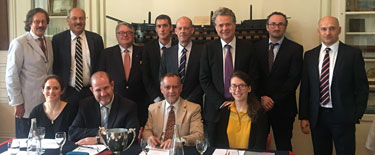 Standing, from left, Winfried Baumbach, Otmar Hammerschmidt, Gerhard Meinl, Michael Jousserand, Jacques Carbonneaux, Jérôme Perrod, François Billecard and Emmanuel Tonnelier. Sitting, from left, Marie-Léa de Gourdon, Renaud Patalowski, Claudio Formisano and Louise Courant. Standing, from left, Winfried Baumbach, Otmar Hammerschmidt, Gerhard Meinl, Michael Jousserand, Jacques Carbonneaux, Jérôme Perrod, François Billecard and Emmanuel Tonnelier. Sitting, from left, Marie-Léa de Gourdon, Renaud Patalowski, Claudio Formisano and Louise Courant.
AUG. 14 | CAFIM | MEETING
CAFIM: Challenges EU Regulations, Names President
On July 20, delegates of the Confederation of European Music Industries met to discuss issues related to CITES as well as lead and nickel use in musical instruments.
During the meeting, members of the CAFIM CITES Taskforce, including Michael Jousserand, Buffett Crampon research engineer, and Jacques Carbonneaux, executive officer at Chambre Syndicale de la Facture Instrumentale, announced an initiative to have as many of the 150 member states involved in the CITES Pact sign a petition to exempt musical instruments from the regulations, claiming CITES restrictions can greatly impact both production and trade.
Representatives from France's Ministry of Culture were also present at the delegates assembly, and CAFIM officials said the government branch was receptive to some of the criticism against the CITES Pact.
The delegates also announced that a number of drafts have been submitted to challenge the European Union's Registration, Evaluation, Authorization and Restriction of Chemicals (REACH) regulations affecting musical instrument making. The law, enacted June 2007, requires all companies in the EU to research and register all substances in their products and demonstrate the substances can be used safely.
Lead is included in the European Chemicals Agency's restriction list, which states products made with lead cannot be placed on the market if the concentration of lead exceeds 0.05 percent by weight. Nickel is also restricted, but the conditions specify products that come in direct and prolonged contact with the skin — such as jewelry — cannot have rates of nickel release exceed 0.5 micrograms/cm2 per week.
CAFIM officials stated the regulations will impact musical instrument production and trade due to inappropriate threshold limits and that there is no clear evidence that instruments containing lead or nickel have potential health hazards, writing, "The delegates are preparing to protect the interests of the musical instrument branch in the best possible way." CAFIM has created a working group to address concerns with the REACH regulations.
During the delegates assembly, it was also announced Emmanuel Tonnelier, director of Vandoren Paris, has taken office as CAFIM President. Outgoing President Claudio Formisano has been appointed to act as commissioner for cooperative links with China. Otmar Hammerschmidt was elected to serve a two-year term of office as vice president of the association.
The next meeting will take place Oct. 9 in Shanghai, one day before Music China.
cafim.org
|